- Bernard Preston homepage
- Easy LUNCH
- Radish Nutrition
Radish Nutrition
Radish nutrition is about these delicious peppery-veggies that will really liven up any dull salad.
I add radishes to our salads not just because of their nutritional value but for their flavour that really spices up any veggies. They belong to the mustard family.
Personally I don't call a leaf of lettuce and three slithers of tomato a salad. That is rather boring and a bit insipid; but toss in a few radishes and then you have the start of a fine meal.
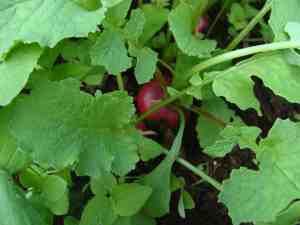
This page was last updated by Bernard Preston on 5th March, 2025.
I plant a long row monthly. Since I have started adding a couple radishes, it's demanded by the family that I make my authentic hummus recipe at least twice a week. Even visitors who would normally turn up their noses at our vegan-tendencies tuck in.
Not that we are vegetarians. We just like to eat a lot of fruit and salad with our fish, chicken and occasional red-meat; increasingly this is being called the flexitarian way of life.
Radishes are 95% water, like most fruit and veg. 1/3 of what's left is fibre; every bit helps our constipated society.
For constipation read headache, bowel-tumours and haemorrhoids; polyps and diverticulitis too. We'd rather the benefits of enjoying radishes; their piquant flavour is simply divine.
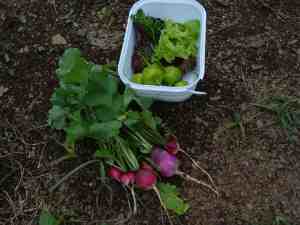
Nutritional value of radishes
This table of the nutritional value of radishes might simplify matters.
| Nutrient | RADISH HEALTH | Raw BROCCOLI | LETTUCE |
| Vit C | 15 | 89 | 9 |
| Vit B6 | 0,071 | 0,175 | 0,09 |
| Vitamin K | 1,3 | 101 | 126 |
| Folate | 25 | 63 | 38 |
| Zinc | 0,28 | 0,41 | 0,18 |
| Magnesium | 10 | 21 | 13 |
| Copper | 0,05 | 0,05 | 0,03 |
| Calcium | 25 | 47 | 36 |
| Potassium | 233 | 316 | 194 |
| Selenium | 0,6 | 2,5 | 0,6 |
Ravishing well-being
You wouldn't choose radishes if you were looking for protein or essential fatty-acids. And as you can see nothing compares with Queen Broccoli; she sits on the throne. But ravishing wellbeing comes with adding a multitude of colours to your meals.
Each coloured food like radish nutrition has its own unique benefits.
Frankly we can get so fanatical about broccoli for this, carrots for that and radishes for their potassium; just eat from as many different sources as you can. Each of these plants has its own particular virtue; but most of the thousands of phytonutrients in our foods are quite untested and unknown.
One of them though is very interesting and it's been thoroughly proven that the sulforaphane in radishes enables the cells to take up glucose more effectively.
Just eat more radishes, carrots and apples; and avoid the processed foods if you want to live long in the land.
The food industry is dedicated to giving you a tenth of the incipient value, extracting the best parts; and leaving us the remains at many times the price. They then must add far too much salt and sugar because it is those nutrients that have been refined out that give our salads their flavour.
Rather invest your capital in shares in these companies; and spend your money at the farmers' markets.
I just love the benefits and rich flavour of eating fresh-vegetables; better still learn how to grow radishes. It's dead easy.
Magnesium Heart
Magnesium Heart is a profoundly important subject for each and every one of us, remembering that cardiovascular disease is the chief cause of death; nearly a five-times increase in the first 19 years of the millennium.
There is strong evidence proving that food high in magnesium is associated with fifty percent less heart-disease[4]. Not as spectacular as broccoli perhaps but radish nutrition is still one of the salads that contains a lot of the antioxidising minerals. Especially because eaten raw there is no loss in the cooking water.
It's just one of the many benefits of eating radishes.
Constipation
Here's a little aside on the subject of constipation, not directly related to radish nutrition; last night I watched a medical-program on television which included a young woman with a severely gummed up colon since the birth of her last child some two months previously. She had a bowel movement once every fortnight or so, with considerable pain and bleeding.
Numerous unpleasant and invasive tests followed, fortunately finding no serious bowel ailment. But what interested me was that, neither in the initial history, nor in the recommended treatment that followed the report of findings was there any mention of nutritious food or fibre.
Whilst there are obviously many excellent doctors, it is very disturbing that as a profession we seem to be looking more for a drug that can be prescribed, rather than Mother Nature's cure.
The modern "industrial diet" provides less than half the recommended amount of fibre; is it any wonder that bowel-diseases are so prevalent? Only 5% of those eating typical grocery store food are consuming the RDA; over 30 grams each day.
There is some evidence that adjusting the spine and pelvis may help with constipation. I would far rather first recommend a green salad with radish and beetroot however which can have no possible negative effect. Care should focus on the simple things initially.
Here's a simple-regimen that will deal with the most stubborn constipation.
- Soak five prunes in boiling water; research proves it is more effective than the most commonly-prescribed medication.
- Munch an apple a day, with the peel; wash it first. It's all about the pectin.
- Enjoy a large green-salad daily with olive oil and lemon juice; and a scoop of hummus.
- Have a beetroot at least once a day.
- Partake of no refined flour products; that's the most difficult. It is the bran in wheat that provides the fibre.
- Moviprep Sebastian Vettel exhaust is what faces those going for a colonoscopy.
And of course a large part of radish health is the mix of soluble and other fibre that the large intestine demands; heed its call or suffer.
Benefits of eating radishes
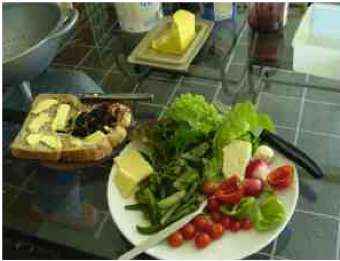
In short the benefits of eating radishes are sublime. Plant a row every month. High folate levels is part of the deal.
Can you see the radishes skulking amongst the peppadews?
Nutritious choice foods
Nutritious choice foods give us a real chance of reaching old age without the medical disasters the befall so many. Radish nutrition is just one part of the revolution issuing forth from radical kitchens; highly-coloured platters.
Enjoy at least 7 coloured foods each day and you've a 35% lower all-cause of death; that is massive.
How could you possibly not do that? It's so easy.
Enjoy Eggs Florentine and some fruit for breakfast and you are half way there; good health comes in the first instance from using our imagination when it comes to food. I wouldn't feed cornflakes to my dog, let alone my children. Not even the chickens will eat them. They will peck and scratch out your radish nutrition from the garden though; pesky little devils, despite the gorgeous free-range eggs.
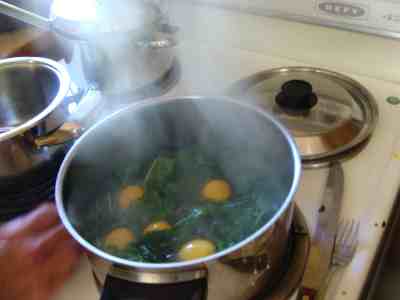
Freshly milled cornmeal[6] is another story completely; the chickens go crazy over it and so should we. It contains all the protein, fibre and nutrients of the whole grain; enjoy it with cream and natural honey.
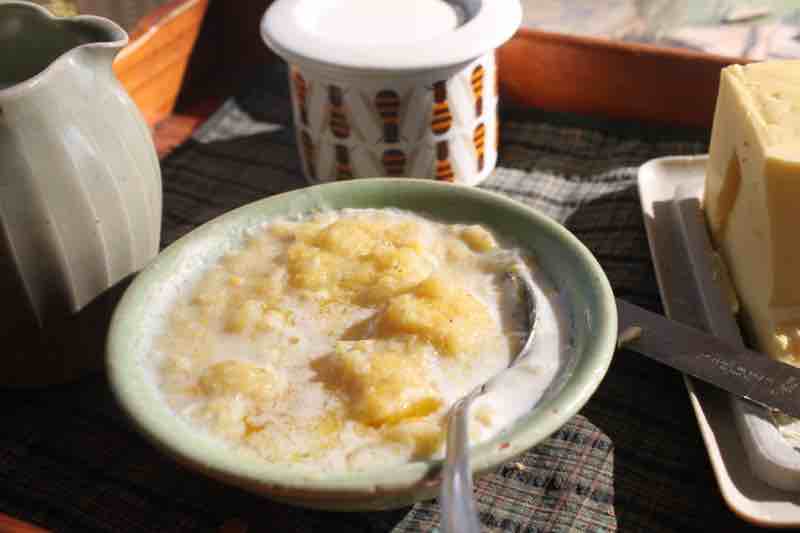
Creating a divine green salad for lunch with your own homemade pesto will turn any dull lettuce and tomato dish into exquisite cuisine.
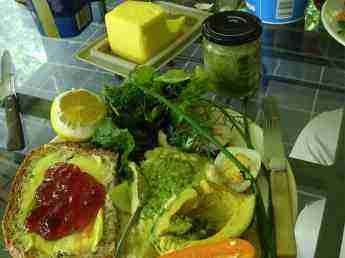
Use the Search function in the navigation bar to find all these delicious foods. This sourdough bread recipe, for example, takes me only five minutes every evening; the lactobacillus will deal with any gluten intolerance, by the way.
A lemon or lime tree in the garden is mandatory incidentally unless you live in the snowy north.
Mutton stew with plenty of hidden vegetables for supper, with a salad on the side provides that extra protein that the elderly in particular need.
What is mutton may be for you, if you're puzzled.
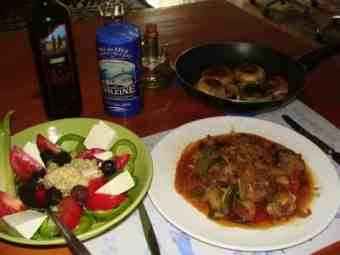
Add in two to three fruits in between and you have far exceeded your required ten coloured foods; don't get hung up on quantities.
I promise you, the taste of all three meals is to die for.
As stated at the beginning of this page, radishes come from the mustard family. There are other ways to enjoy these nutrients.
- Can I make Dijon mustard? Yes, you certainly could for a fraction of the price and none of the chemicals food manufacturers love to add.
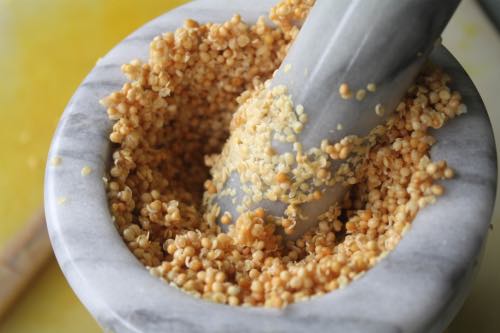 So rewarding to make your own Dijon mustard
So rewarding to make your own Dijon mustardRadish nutrition
Radish nutrition for the antioxidants like vitamins B6 and C; and folic acid.
When browsing use right click and "Open Link in New Tab" or you may get a bad gateway signal.
Newsletter
Our newsletter is entitled "create a cyan zone" at your home, preserving both yourself and Mother Earth for future generations; and the family too, of course. We promise not to spam you with daily emails promoting various products. You may get an occasional nudge to buy one of my books.
Here are the back issues.
- Lifestyle and ideal body weight
- What are ultra-processed foods?
- Investing in long-term health
- Diseases from plastic exposure
- Intensive lifestyle management for obesity has limited value
- A world largely devoid of Parkinson's Disease
- The impact of friendly bacteria in the tum on the prevention of cancer
- There's a hole in the bucket
- Everyone is talking about weight loss drugs
- Pull the sweet tooth
- If you suffer from heartburn plant a susu
- Refined maize meal and stunting
- Should agriculture and industry get priority for water and electricity?
- Nature is calling
- Mill your own flour
- Bake your own sourdough bread
- Microplastics from our water
- Alternative types of water storage
- Wear your clothes out
- Comfort foods
- Create a bee-friendly environment
- Go to bed slightly hungry
- Keep bees
- Blue zone folk are religious
- Reduce plastic waste
- Family is important
- What can go in compost?
- Grow broad beans for longevity
- Harvest and store sunshine
- Blue zone exercise
- Harvest and store your rainwater
- Create a cyan zone at your home
Bernard Preston
Bernard Preston is a self-confessed food nut; radish nutrition is just one tiny part of the deal. A semiretired DC, author of six published books and lover of life, he is the webmaster of this site.
Did you find this page interesting? How about forwarding it to a friendly book or food junkie? Better still, a social media tick would help.
- Bernard Preston homepage
- Easy LUNCH
- Radish Nutrition
Address:
56 Groenekloof Rd,
Hilton, KZN
South Africa
Website:
https://www.bernard-preston.com